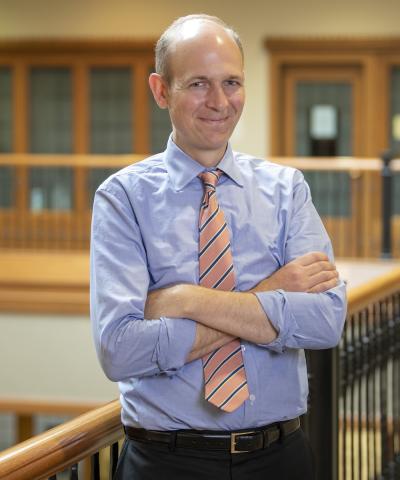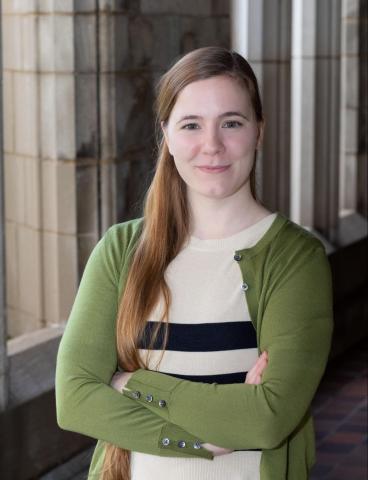The Law School Welcomes Two New Faculty Members
The Law School is pleased to welcome two new scholars to its academic faculty: Samuel Bray, ’05, who joins the faculty on July 1, 2025, and Lucy Msall, MLS ’23, PhD ’25, who will begin in July 2026 after completing a post-dissertation fellowship at the National Bureau of Economic Research in Cambridge, Massachusetts.
Both scholars bring unique strengths and exciting scholarly agendas that will deepen the Law School’s long-standing commitment to excellence in teaching, research, and interdisciplinary engagement.
“We are thrilled to welcome Sam Bray and Lucy Msall to our faculty,” said Thomas J. Miles, Dean and the Clifton R. Musser Professor of Law and Economics. “Sam is a leading scholar of remedies and equity, and he is the nation’s foremost authority on universal injunctions. Lucy brings exceptional empirical skill and fresh insight to questions of tax policy. Each exemplifies the high scholarly ambition and intellectual rigor that define our faculty.”
Samuel Bray: A Leading Voice on Remedies and Judicial Power
Bray, a leading expert in remedies and equity, returns to UChicago Law from Notre Dame Law School, where he serves as the John N. Matthews Professor of Law. He previously taught as a visiting professor at UChicago Law and is also an alumnus of the Law School, having graduated in 2005. (Immediately after graduation, Bray clerked for then-Judge Michael W. McConnell, ’79, on the U.S. Court of Appeals for the Tenth Circuit.)
Bray’s scholarly work has shaped national debates on judicial remedies—particularly the doctrine of nationwide (or, as he prefers to call them, universal) injunctions. His scholarship was cited multiple times during US Supreme Court oral arguments in the closely watched birthright citizenship cases, which involve a challenge to such an injunction.
“One of the things that draws me to the Law School is its relentless curiosity and pursuit of ideas wherever they lead,” Bray said. “That was true when I was a student, it was true when I returned as a visiting professor, and I know it will be true now as a faculty member.”
Bray emphasized the intellectual intensity of the Law School and the unique culture of collaborative critique among faculty. “The roundtable lunches are a kind of incubator for ideas,” he said. “Whatever ideas you have get better—and you help make everybody else’s ideas better.”
Bray’s path to his scholarly focus began while he was in private practice at Mayer Brown in Washington, D.C., where he encountered a perplexing problem related to declaratory judgments during a pro bono case. That experience spurred what became his first major law review article—published in the University of Chicago Law Review—and ignited a passion for the study of remedies and judicial power.
“Remedies is where law meets justice,” Bray said. “It’s intensely practical—what will your client actually receive from the court?—but it also forces you to confront some of the most profound limits of what courts can do.”
Bray is also known for his creative and metaphor-rich teaching style. “Some legal doctrines are like a chef’s knife—versatile and capable of many uses,” he explained. “Others are like a garlic press—built for a very specific task. And judges are like cooks in a galley kitchen. Instead of a huge number of doctrines that are highly customized, they need a smaller number of doctrines they reach for more often.”
In addition to his teaching and scholarship, Bray has played a prominent role in shaping public discourse. He has testified before the Senate Judiciary Committee, the House Judiciary Committee, and the Presidential Commission on the Supreme Court. “I see this as a form of public service,” he said. “Congress should deliberate, and if I can help improve that process—even slightly—that’s worthwhile.”
His scholarship on nationwide injunctions has become highly influential. Bray was an early voice raising concerns about the expansion of universal injunctions, and his Harvard Law Review article, “Multiple Chancellors: Reforming the National Injunction,” helped frame the issue for both courts and lawmakers.
“This is a bipartisan concern for me,” he noted. “My friends on this issue change every four years. But I believe that these injunctions pose real problems for judicial legitimacy, democratic accountability, and the development of law.”
Bray is excited to return to UChicago and to engage with students on these complex legal questions. “The students here are intellectually fearless,” he said. “It’s exactly the kind of environment I want to be part of.”
Outside the classroom, Bray likes cooking, reading while walking, and playing baseball with his kids.
Lucy Msall: Bridging Law, Economics, and Public Policy
Msall, who earned her PhD in economics at Chicago Booth and her MLS at the Law School, brings a strong interdisciplinary approach to tax and economic policy. Her research explores how government policies affect behavior, using methods grounded in both institutional knowledge and empirical rigor. Her scholarship has examined topics ranging from capital gains taxation in Norway to China’s use of digital coupons as a stimulus tool and the impact of regulatory barriers that long excluded women from clinical drug trials.
“I realized during my PhD that I wanted to do research at the intersection of law and economics—particularly tax—but I didn’t yet have the institutional grounding to do that work well,” Msall said. “That’s what drew me to the Law School. The MLS program gave me the opportunity to take a lot of tax and regulatory law courses and to immerse myself in a legal academic environment.”
Msall is the first graduate of the Law School’s MLS program to transition directly into legal academia, an outcome envisioned by faculty like David Weisbach, who helped shape the program. “Even if I had ended up in an econ department, it would have been a great experience,” she said. “But for me, it opened the door to legal academia.”
Her MLS coursework, combined with her economics background, has fueled a wide-ranging and impactful research agenda. In her award-winning dissertation, Msall used a natural experiment in Norway to evaluate how inheritance tax rules affect capital gains realization. Her findings showed a 58% increase in capital gains tax revenue following the removal of the stepped-up basis, offering real-world insights relevant to current US policy debates.
Another project analyzed China’s use of app-based, time-sensitive digital coupons during the COVID pandemic. “We found that the structure of the incentives—threshold-based, time-limited—dramatically increased consumer spending,” she said. “It’s a form of ‘consumer-financed fiscal stimulus’ that could offer lessons for US policy.”
A third line of work explored the consequences of FDA guidance that discouraged including women of childbearing potential in early-stage drug trials. “When it became harder to develop drugs for women, innovation followed the path of least resistance,” she explained. “And when the policy changed, we saw an immediate spike in female-focused pharmaceutical patents.”
Msall is particularly excited to teach tax law to future generations of public-minded lawyers. “A lot of students come into tax thinking it will be dry or overly technical,” she said. “But if they give it a chance, they’ll see it’s one of the most policy-relevant areas of law.”
She hopes to help students overcome the initial learning curve and engage deeply with topics like income inequality, social welfare policy, and climate incentives—all increasingly shaped through the tax code. “So much of what matters in today’s public policy is happening through the tax system,” she said. “Learning how that system works is crucial for anyone who wants to have an impact.”
Msall enjoys open-water swimming in Lake Michigan—even in the winter months—cooking meals for friends and family and spending time with her one-year-old child.

